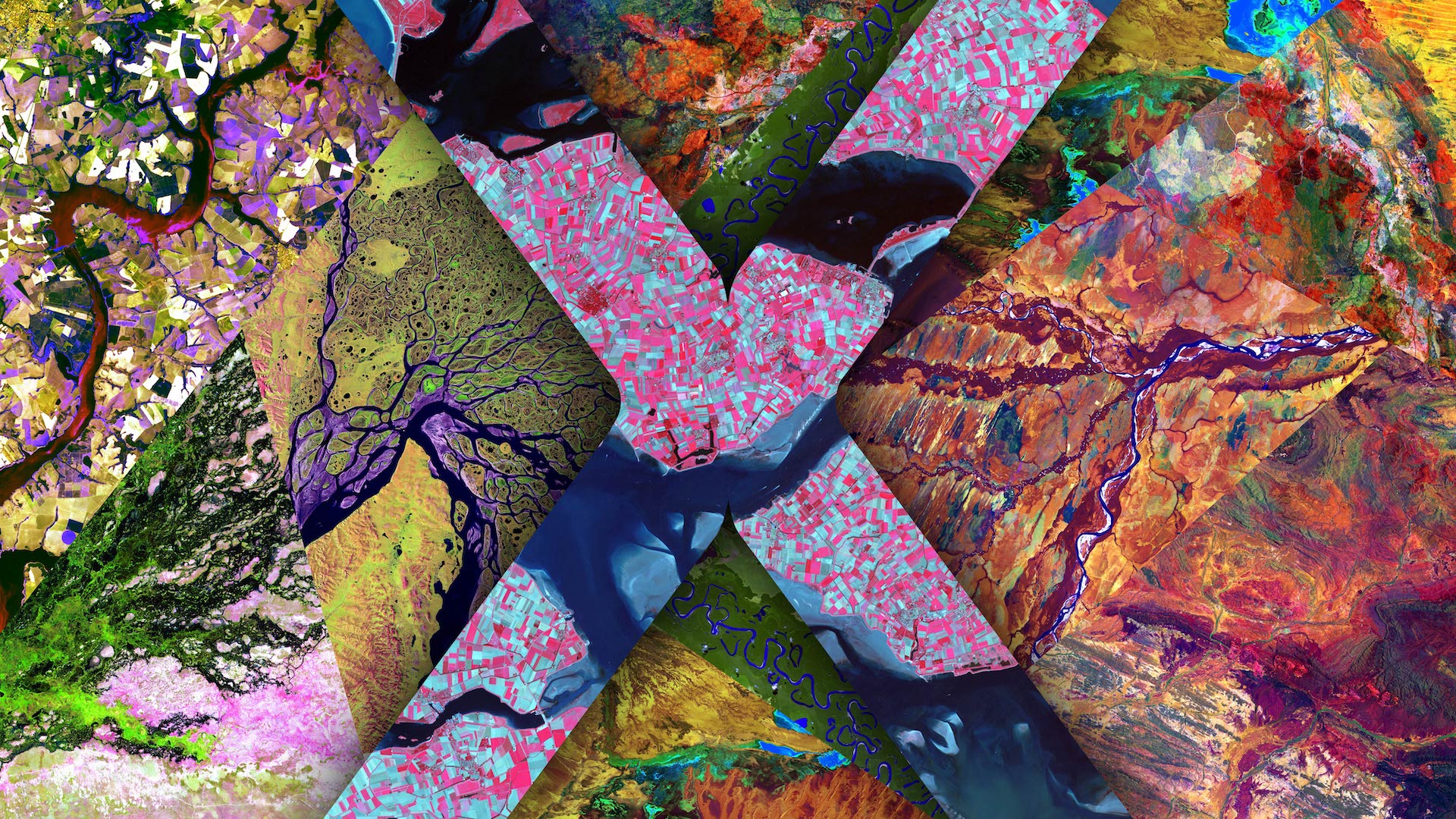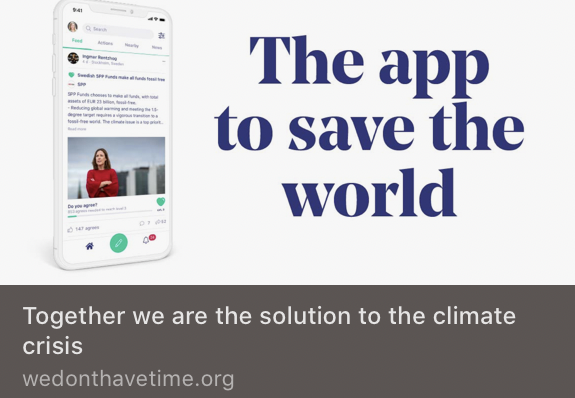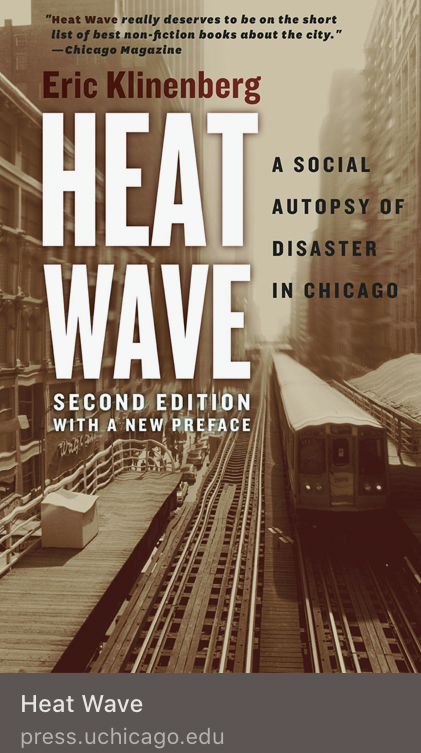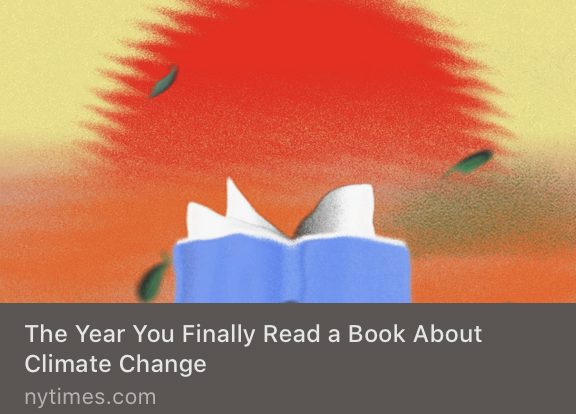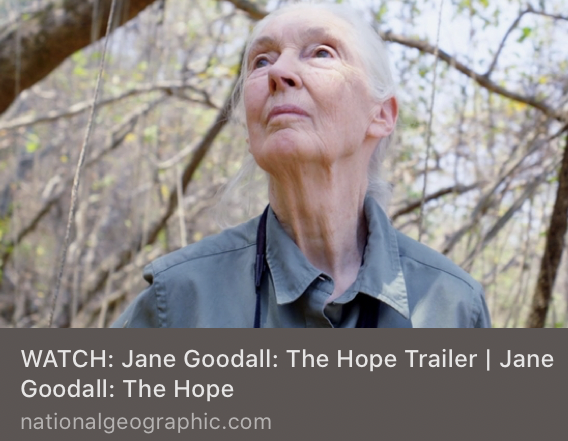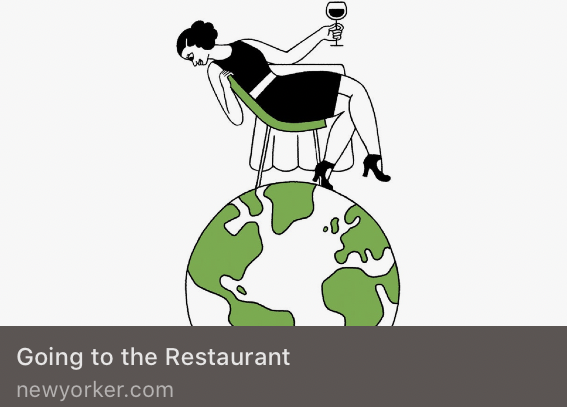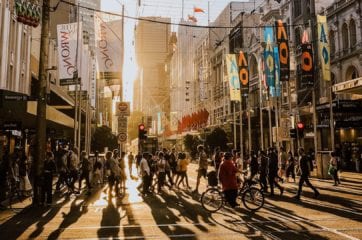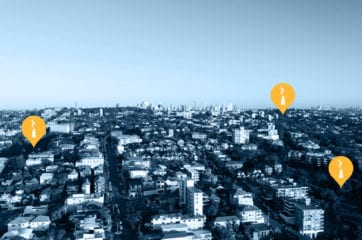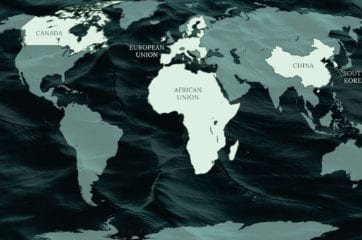Earth Day feels different this year. Actually everything feels different this year as the days at home grow to weeks and months, and we face the increasingly heavy weight of the devastation of the coronavirus. It seems odd to even use the word ‘celebrate’ to describe the 50th anniversary of Earth Day. Or is it more important than ever to recognize this historic date and continue catalyzing the movement to prevent ever-more suffering in the future from the other impending crisis we collectively face?
We have a lot of feelings, and even more questions around what today means, and how we can best honor it, given the times. So we decided to do things a little differently, and simply talk it out as a team, sharing some of what we have been reading, reflecting on, and thinking about together.
The following is our Slack team chat over the past couple of days. Join the conversation in our socials, we’ll see you on Twitter, or Instagram, or in your preferred platform!

Maria
Good morning! I thought we could use this space to talk a little bit about where our hearts and minds are as we prepare for the 50th year of Earth Day amid the ongoing uncertainty and devastation of the covid-19 pandemic.
How is everyone thinking about it this year?

Christian
I think it’s really encouraging to see so much mobilization within the movement to transition the entire day and related events online. While I think it’s difficult to celebrate in separation, I also believe it leaves more room for reflection on the significance/history of Earth Day, the different environmental issues that are important to us, and the current situation we’re in today.
![]()
“I hope we don’t resort to thinking a world that takes climate change seriously looks like the world we’re living in today, and instead, I hope we continue prioritizing crafting a vision for a high-functioning society that relies on clean energy.”
— Noa

Noa
I agree – it’s been exciting that so many conferences and events have gone virtual, particularly as we grapple with the carbon footprint of a lot of the global events and conferences, like COP and others, that tend to dominate the climate movement. We Don’t Have Time is hosting a cool virtual Earth Day conference with daily themes and lots of cool lectures from around the world. What’s funny is that this conference was always meant to be virtual, so they’re actually really well-prepared.
![]()
![]()

Maria
How are we thinking about the lasting effects this will have on how we do business or engage with each other moving forward? I know that WFH, and increased virtual conferencing has been posed as a climate solution well before we were forced to do it in this way. Do you think it will become more of the norm now that we know it is in fact possible?

Noa
I’ve been thinking a lot about this. I do think WFH will likely increase as a result of this time, although people are probably going to be itching for social interaction. I hope we don’t resort to thinking a world that takes climate change seriously looks like the world we’re living in today, and instead, I hope we continue prioritizing crafting a vision for a high-functioning society that relies on clean energy. Virtual conferencing, however, might be increasingly advantageous as we see climate conferences with enormous carbon footprints and very little viable alternatives to flying in many cases.

Maria
I absolutely love this sentence: “I hope we don’t resort to thinking a world that takes climate change seriously looks like the world we’re living in today, and instead, I hope we continue prioritizing crafting a vision for a high-functioning society that relies on clean energy.”
And couldn’t agree more! I do think the future can hold a more flexible approach to work which takes into account not just climate but lifestyle – how can we have a better quality of life through reduced commute needs, and how can we be more flexible on families raising children, etc.

Christian
I saw that Noa! I’ve actually compiled some resources, events, and ways to be engaged for virtual Earth Day in this doc. There’s some really cool events happening all week.
![]()
![]()

Amanda
Amazing list, Christian! Thanks for compiling it!
This Earth Day will be very different, with walks limited to essential outings and encountering people evoking fear instead of a communal celebration of warmer weather.”
— Amanda

Carlie
I think for me, this Earth day really represents the durability of the climate movement and its ability to adapt to changing circumstances. There’s definitely a strange dichotomy right now as spring is beginning and we see all this new life growing as our world simultaneously faces tragedy. But I think that Earth day/ week gives us the ability to reflect on what we do have — I know for me, one of the things I’ve really begun to appreciate while in quarantine is the ability to go on walks outside, and I’ve noticed so much more about the nature around me now that I have the time to really appreciate it.
![]()
![]()

Amanda
For me, Earth Day marks the beginning of spring, when plants start coming to life and Bostonians emerge from their winter hibernations. The trees begin to bloom and the ducklings can be found swimming in the Public Garden. I love walking around the city year-round, but when Earth Day comes around, the rest of the city starts coming out and gathering in our parks and sidewalk cafes. Earth Day is a reminder of the cycle of nature and a love letter to the re-emergence of life after a long winter. This Earth Day will be very different, with walks limited to essential outings and encountering people evoking fear instead of a communal celebration of warmer weather. But, nature is still coming to life and I’ve made sure to appreciate the blooms on my infrequent trips to the grocery store.

![]()
![]()
![]()
“The coronavirus does not discriminate…However, our country does discriminate based on race.”
— Wandra

Wandra
I find it difficult to “celebrate” 50 years of Earth Day this year. Why? Because this year we are living with the devastation of the COVID-19 pandemic – a pandemic that has highlighted the injustice that still exists in our country. So, here is where my heart and mine are as we prepare to recognize 50 years of Earth Day.
I clearly understand that the coronavirus does not discriminate. It does not care if you are black or white, young or old, rich or poor, Christian or Jewish… However, our country does discriminate based on race. Targeted communities in the U.S. face disproportionate risk from COVID-19 due in part to the lack of access to health care and high levels of unemployment. We cannot ignore the link between the disproportionate impact of COVID-19 on African Americans as well as the longstanding health disparities and economic disparities in the United States.
My heart aches when I think of the many people who contracted COVID-19 and died because of underlying illness, particularly community of color. Maryland, one of the few states that has collected this data, indicates that 53% of COVID-19 related deaths were Black and 49.9% of Blacks in the state tested positive. Maryland’s population is 30% Black and 60% White.
I am one of those who believes some of those underlying illnesses that have caused the death of so many were caused by air pollution – illnesses such as asthma, and cardiovascular disease. In addition to eliminating healthcare and economic disparities in the United States we must make environmental and climate justice a priority when we reopen our country.
![]()
![]()
![]()
![]()
![]()
![]()

Marc
Wandra – I couldn’t agree more. We need to deal with the inequality involved in climate injustice. Thanks for reminding us. 53% of COVID-19 deaths in Maryland being Black is just criminal.

Maria
Thank you Wandra for this important reflection and reminder. It is a horrific reality that is brought to a much brighter spotlight in times of disaster – that historic and ongoing systems of oppression and discrimination are in fact crucial determinants of health outcomes. It has made me think back on the aftermath of climate disasters as well, like hurricane Katrina, and the 1995 Chicago heatwave.
On the latter, last week I found myself going back through some of the pages of Eric Klinenberg’s book, “Heat Wave: A Social Autopsy of Disaster in Chicago” where he does an exceptional job at deeply going through the ways communities of color and those with overlapping social burdens and vulnerabilities bear the brunt of the pain and suffering in times of disaster. It is unfortunately, as relevant as ever.

Wandra
MVO – Thank you for sharing the passage from Heat Wave. I was going to ask the question, “When will we learn”. But, we have learned. We learned from the Katrina hurricane and the Chicago heat wave, water crisis in flint (I could go on). The real question is, what is it going to take for our political leaders, for our lawmaker to have the political will to address the systematic inequalities that exist in the U.S.?

Ruby
Right now I’m home in White Plains, New York. It’s in Westchester county, just north of NYC, which is one of the hardest hit counties in New York and the country from COVID-19. I have friends and neighbors who are sick, and I know nurses working at the White Plains Hospital. So it’s pretty terrifying to go anywhere right now, and I try to stay home as much as possible. I love to hike and take my dog for walks in the woods by my house, but I even run into people when doing that. I’ve now learned to appreciate nature in my own backyard. I’m in the process of getting our vegetable garden ready for the summer, which has been a nice way to keep busy. Sprouting seeds are not exactly the most breathtaking things I’ve ever seen, but it’s a simple reminder that nature is everywhere.
![]()
![]()
![]()

Maria
Ruby thank you for sharing that, and I am so sorry to hear your community has been so heavily struck by the virus. Excited to see some pictures as your seedlings develop, I am also looking into some planting options in my (very small) Boston flat! Plants really do make people happy.
![]()
![]()

Michael
Ruby, my heart hurts for White Plains and all of the greater New York City area. Sending our love to you all.
“I’ve been thinking about the ability for individuals to make a difference in fighting for a better climate, and a better environment locally.”
— Tim

Tim
This year I’ve been thinking about the ability for individuals to make a difference in fighting for a better climate, and a better environment locally. In my hometown of Weymouth we have three beautiful parks that form an enclosed open space around a tidal marsh called the Back River. Its history is dominated with suggestions to develop the area, and which was largely prevented by one woman who sought to preserve the area and restore it to its natural state. Meanwhile in north Weymouth we had a battle in the 90’s over the proposed building of a wastewater dumping sight (Clean Harbors) that was defeated by 3 people who decided to oppose it at a kitchen table. And today we have the compressor which, despite being built, is now 5 years past its original scheduled date of completion and half the capacity originally planned. Although it’s easy to feel like a cog in a much larger machine, I think we all have the ability to both understand how it works and make a difference in changing its direction.
![]()
![]()

Tim
One reason why: a lot of people can trace the reason they joined climate activism back to project they were fighting, or a policy they were pushing. Both are usually narrow in scope, and don’t lead to systemic change themselves. But the act of opposing them activates another person in the fight.
![]()

Tim
Recently Weymouth compressor protesters did a 50+ car parade past the compressor site, which is wicked creative! Seriously though, it really is a systemic issues, but I can’t imagine a world without robust, individual grassroots participation.

Maria
Thank you for sharing this Tim!
Has this power of individuals in a larger movement, and the role you see there changed at all because of the pandemic?
I have been thinking a lot about something Emily Atkin wrote on how we are seeing very clearly the role of individual action in stifling the spread of this virus, and how it made her reflect on the role of individuals in acting on the climate crisis – something that has been debated on before as it’s been deemed much more of a systemic issue that requires systemic change, particularly from a handful of companies responsible for fossil fuel production.

Amanda
Wow, that’s so insightful, Tim! I have never thought about how people originally get involved with environmental activism, but your framing makes a lot of sense. When I worked at the State House, a lot of my boss’s constituents became involved with environmental activism because of the town’s notoriously high rates of gas leaks. They started looking into the issue because of the immediate risks that gas leaks cause for neighborhoods, like possible explosions, but that led to them learning more about natural gas, which led them to become interested in renewable energy, and that opened the door for so many other environmental causes they began championing at the state level. I think being able to witness the negative impacts of environmental issues first hand creates more motivation for solving the real root of the issue.

Maria
Absolutely! This is something we see crystallize in our communications workshops where we break out and ask people to share stories of why they personally came to care about the climate crisis. Two things are always so incredibly apparent from this exercise: first, the massive diversity of personal motivators or ‘sparks’ that awake people to the larger issues; and second, the eventual convergence of those widely different experiences into the realization of needing prompt action and large scale changes that they come to be involved in advocating for – it is definitely one of my favourite things to be a part of, and there is so much power in those personal accounts and stories!

Amanda
Since we’ve all been spending more time indoors, has anyone been reading any climate-inspired books?

Maria
Yes! I joined HEATED’s book club, reading Braiding Sweetgrass, and it is truly one of the most beautiful reads I have ever come across. It begins with the premise that while so many of us can easily and promptly come up with examples of ways human beings harm the Earth and nature, very few of us can think of the opposite examples: where and how can humans coexist and in fact to be a part of the natural world in a way that nourishes nature while going back to our own place within in?
This is something I myself think a lot about in my work, and around the idea that in order to get through this crisis – actually both the pandemic and the climate crisis – we need to retell our stories in a way that allows us to imagine a future that is better and brighter because of our actions and decisions, not despite them.
This book is a perfect start, I think of it as a love story about the Earth and its inhabitants. It brought a lot of humility, as well a new way to looks at the natural world and non-human animals and beings – I don’t think I will ever see it the same after seeing it through her eyes, and through some of the Native stories she shares. It really made me reflect on the power of connection, story, and how we have learned to see ourselves and our place on this Earth can truly change everything.
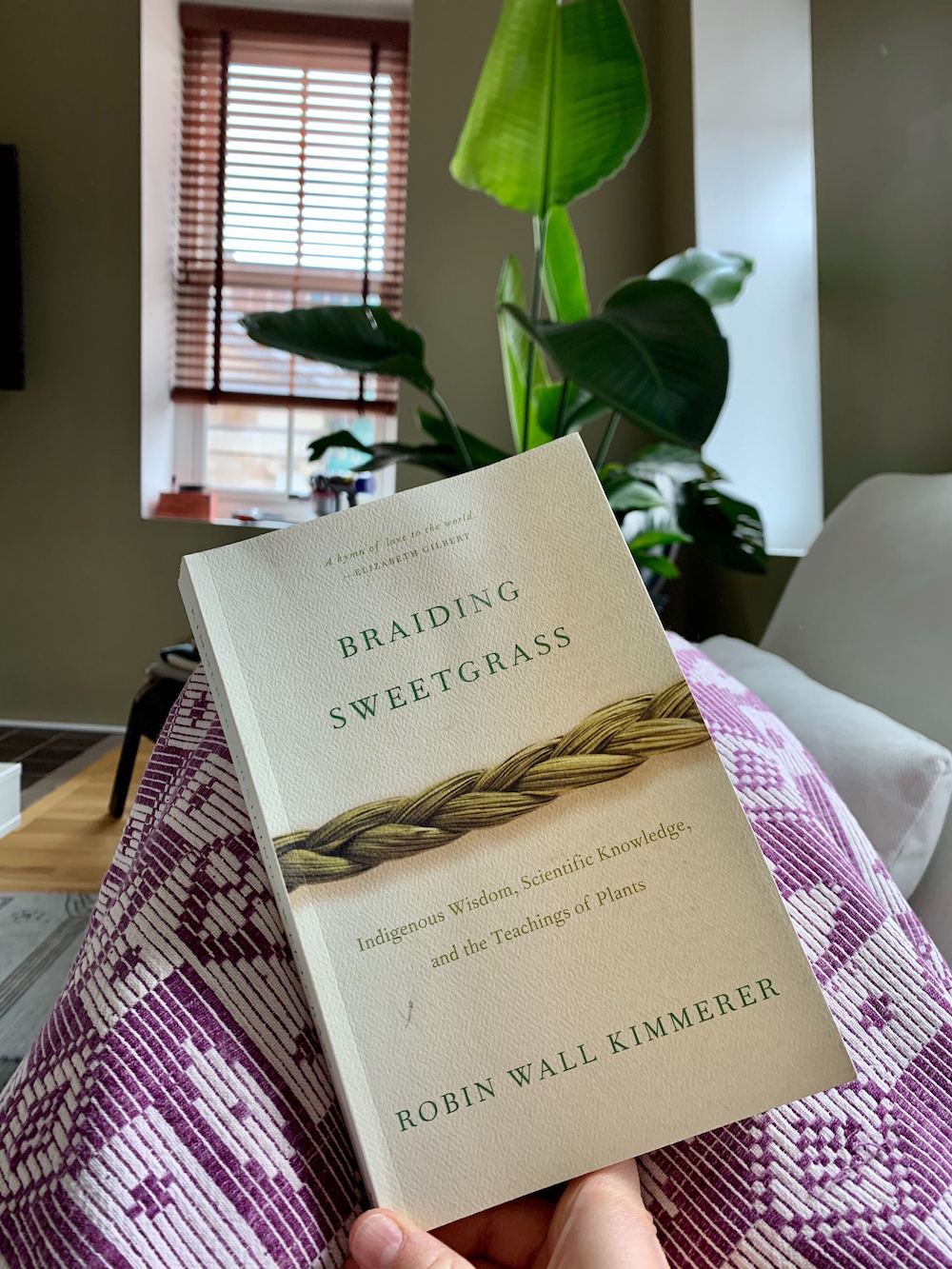
“My hope is that we continue to stray from that formula, where the hope and optimism is used as an end thought and not as the framing of an entire article/book/documentary.”
— Amanda

Maria
The Overstory from this list is also an incredible read – you learn so much, but it reads like a beautiful novel. Got a lot of perspective from it. It is also interesting to think about how many of these, and generally writings on the climate crisis, focus on the negative impacts or bleak futures, versus how many we see challenging the doom-and-gloom argument. I do see that trend changing slowly, but what do we think about the over-telling of the horrendous consequences of the climate crisis, and how that will impact our ability (or inability) to envision better outcomes, and believe we can still change those trajectories?

Amanda
I completely agree about the article. I love how the suggestions are given based on what information you’re seeking about climate change and how you feel about climate change. I’d also be remiss if I didn’t mention how the animated graphics also break up the sections of the article, which helps set the tone for each section of recommendations. Not only are they compiling a reading list that is easy to navigate to make the decision of what you’d like to read, but the graphics pull you in and make you want to scroll to the end of the list.
For your second point, balancing the need to realistically explain what’s happened in the past and present (and what’s predicted to happen) and not painting too doom and gloom of a message is difficult with climate change. Yes, I wholeheartedly believe that stories of hope and optimistic framing of the challenges we’re facing is absolutely important (your research on the topic proves that!) and I see more writing steering this way. I think climate-focused content tries to explain the science of what’s happening and what that means for our societies (which is very scary and daunting) and then end their piece on a bright note of having optimism about what we can achieve. It’s traditionally the standard way environmental documentaries are set up as well. My hope is that we continue to stray from that formula, where the hope and optimism is used as an end thought and not as the framing of an entire article/book/documentary.

Maria
it has certainly been a hard balance to strike between talking about the projected impacts on current trajectories of emissions, vs. the potential we still have and agency to in fact change those trajectories and give us a different kind of future. I fully agree that we are realizing the importance of the latter increasingly within the movement.
On your first point, I am fully convinced that art – in all its forms, from design, photography, storytelling, film, etc. – has a crucial role to play in bringing this message centered around active hope to people. I actually came across this just now, a new documentary series with Jane Goodall called “The Hope” airing tomorrow!

Amanda
“I’m a huge fan but I’m sure that you hear that all the time” …. “Well it’s better than hearing I hate you”

Amanda
Jane Goodall was my childhood hero and I need to watch this! You’re right that this series seems to defy the trope of pinning scientific facts against narratives of hope. I like how this new series seems to focus on her activism in recent years vs. the start of her career working with chimpanzees (although I would love to see some chimpanzee footage in the series). Jane Goodall is so inspiring and if anyone can combine science and hope, it’s her. I’m so very excited to watch it!
![]()

Amanda
What a line!

Maria
hahaha yes! She’s so great

Carlie
ooo thanks for the list Amanda, and for the suggestion Maria! I’ve been reading so much now that I have more time so def. need more suggestions
“As we write this, the oil market is going a bit haywire, with prices just dropping into the negatives in these past few minutes.”
— Maria

Marc
Energy as the key issue
When I began working on energy issues it was at the time when energy imports were the big question – how can the U.S. stop importing so much of our oil and being vulnerable to OPEC and other exporters? That was the beginning of the effort among environmentalists for efficiency and renewable energy, and of my work on energy policy. Then in the late 1970’s the industry push was to replace fossil fuels for generating electricity with nuclear power. That led to the anti-nuclear power movement, which was my introduction to activism, and which led to the end of building nuclear power plants in the U.S. All this was before global warming became an issue.
Since the late 1990’s climate change has become the critical energy issue, first worldwide and more recently in the U.S, and of my involvement. Meanwhile, the growth of fracking, first for gas and then for oil, has led the U.S. to become the world’s largest producer of oil and natural gas, displacing Saudi Arabia and Russia. Now the U.S. has a huge stake in producing more fossil fuels, led by the leading fracking states, including Pennsylvania, Texas, and North Dakota. The answer remains renewables and efficiency, and overcoming the opposition of all those who live off of producing and consuming fossil fuels.

Maria
I’m curious to hear how you are thinking about the current oil crash and its significance to the future of the fossil fuel industry, or an inflection point to its decline.

Marc
not sure that there is a big effect – once the COVID downturn is over, demand for oil and prices might go back up.

Maria
as we write this, the oil market is going a bit haywire, with prices just dropping into the negatives in these past few minutes – do we have any thoughts on its implications? (I already have a queue of text messages from friends asking this very question)

Jonah
This is a very important moment for divest. The global oil market has known for a long time that the time would come where suppressed global demand would leave to a price collapse. They thought, however, that would happen sometime in 2030 with plenty of warning. This is a fast-forward of that moment.

Jonah
It solidifies, with a lot of pain to governments and investors, what we’ve known for 5+ years, which is that oil and gas is an incredibly bad investment in the long term. It’s too bad that local Americans will get hurt by this massive collapse and the consolidation of the market that will follow. The US played itself by ramping up oil production in the name of energy independence, knowing that our oil projects can’t compete with other major producers.

Jonah
Marc’s right, prices will come back to normal (perhaps a new, lower normal) once the pandemic passes. But in the meantime essentially ZERO US oil companies can weather this storm. Expect oil in Trump’s coffee cup tomorrow morning, since the Strategic Petroleum Reserve is already filled to the brim.

Tim
Wait, confused here. This drop is caused by systemic demand reductions? I thought the drop in prices was caused by: A.) a drop in median term demand during the pandemic/recession, and B.) the price war between Russia & OPEC? @Jonah KF

Jonah
It is, but a week ago the price war was reversed by a new deal. Oil countries touted that deal as “historic”, but it only cut production 10% below usual case. Global demand is like 35% below usual case. These major oil countries could never agree to a deal that would match the severity of this moment (although today’s events might make them reconsider).

Jonah
There’s too much individual interest to produce oil. “Why should I reduce my own production of a product that my state relies on? Those cuts should come from elsewhere.”

Jonah
If Trump can bring Saudi Arabia and Russia to the table and actually achieve a 35% cut in global production, THEN I’ll finally be impressed with his business acumen

Tim
Interesting take on Russia’s insistence to reduce prices: that in a world where climate action will happen, and demand does decrease, that Russia wants to corner the global oil market for the next decade.

Jonah
It’s out of their control now. No one country can solve this glut. Expect mass bankruptcies. Then consolidation of oil businesses. Russia can withstand that process better than others and be one of the few to pick up the pieces for pennies on the dollar.

Michael
Does anyone else have a specific place (park/hiking trail/ lake) that they are missing on this Earth Day? We cant get to the places we love without putting those communities in jeopardy.

Jonah
Borderland State Park in Easton, Massachusetts. You can hike the trails carefully, but the disc golf course is closed. That’s my favorite way to appreciate nature!
![]()

Carlie
My grandparents live on Keuka Lake, one of the finger lakes in upstate New York. My family usually goes there to visit in the spring, and it’s such a beautiful time to see everything opening up. There’s a ton of beautiful parks and hiking trails next to streams with small waterfalls, and I definitely am missing it this year!

Ruby
I definitely miss hiking in the White Mountains in New Hampshire, especially now since it’s starting to get warmer. Under normal circumstances I try to go up pretty regularly on weekends when I’m in Boston, but being in NY right now means they’re even more inaccessible.

Amanda
Every spring I travel back to where I grew up in Western Mass and hike a trail that leads to an area called the horse caves, a cluster of rocks where militia men would hide their horses from the British during the Revolution. I know the trail by heart and always appreciate revisiting it every year with my family. I will definitely be missing it this year!
“Potentially 2020 is another step in the evolution of what Earth day means for us as a society.”
— Michael

Michael
We are all sharing the personal impact that Earth day has on our lives. Do you think most people are using this time to reflect? Potentially 2020 is another step in the evolution of what Earth day means for us as a society. It started out of the antiestablishment movement but over the past few years/decade has become very commercialized. Maybe ‘Earth Day quarantine’ will change this.

Carlie
Yes, I definitely think that people are using this as a time to reflect, but also to find new ways to mobilize the climate community. It’s definitely difficult to feel like you are a part of a larger movement when we’re so isolated, but I think that the way that different organizations are finding solutions to this now, during the pandemic, may be representative of a larger shift not only in how we celebrate Earth Day, but also as to how we connect people from different areas of the country, and the world, in the climate space.

Carlie
Maybe this will help to reduce the commercialization of Earth Day, and help us focus more on the impacts climate has on individuals and communities as well.

Tim
Interested and excited about how the youth climate movement uses this Earth day. They’ve already heavily based in online organizing, and I wonder if their able to leverage this advantage to make a big splash this year.

Michael
In the past, I know people have used Earth day to give back. Is anyone planning on volunteering this year? I would be interested to find creative ways to give back.

Tim
My family usually participates in an annual town clean up, but that was canceled this year. Instead we are just gonna show up to our favorite park and clean up ourselves!
“I have been thinking a lot about our colleagues and the environmental advocates in the frontlines of this movement and really the incredible resilience this kind of work takes.”
— Maria

Amanda
Ok, so I want to share an article that I read every once and a while because 1. It’s silly and I think we can all use some humor at this moment in time and 2. I love how the author describes the world and humans without any societal or cultural lenses. As all of our lives transform to a new reality and we settle into a new way of interacting with each other and the environment, I found myself re-reading the article with an entirely different perspective this time. I’ve most likely shared this with you all before, but I want to share it again in honor of Earth Day.
My favorite lines of the piece reminds me how strange and wonderful Earth is: “There are white puffs floating in the air here; they hover high above my house. The puffs turn into wet water bloops and fall down and turn my hair from straight to curly. The water bloops also make the flowers open up; they turn dust into mudslides; they can intercept sunbeams and make them into arches that you can’t touch because they are only swoops of colored light.”
![]()
![]()
![]()

Tim
Big fan of Jenny Slate! We really do need to keep in mind that we’re dealing with big problems out there, but that it’s important to take a second to laugh every once and a while. Thanks for sharing Amanda!

Maria
It is definitely very important to find joy and laughter! I have been thinking a lot about our colleagues and the environmental advocates in the frontlines of this movement and really the incredible resilience this kind of work takes.
Especially during times as difficult and harrowing as these – with the compounding mental health effects of the ongoing pandemic, and the weight of the responsibility to change the current trajectory of the climate crisis – it is truly important to consider how we are taking care of ourselves and each other in this work.

Amanda
I wholeheartedly agree. When I first started working on climate policy at the State House, one of the seasoned advocates we worked with had the saying “Sometimes you have to laugh so you don’t cry.” I saw it as a coping mechanism for working both on climate change and legislation. Passing bills is a slow and unrelenting process that can feel like you’re getting endlessly pushed down and ignored. And those same feelings can exist when advocating for solutions to the climate crisis. When you compile the two together, you can easily feel downtrodden and defeated because legislation can take years to pass and it’s tough for legislators to focus on an issue they perceive to be long-term when there are so many pressing issues they want to address now. Taking a moment to pause and regroup can help you continue working and making a difference. I think this is especially true now and I’ve found it difficult to balance my feelings about the urgency of the pandemic and how that fits with the urgency and action required by the climate crisis. We are always going to live in a world with a collection of crises of different sizes. I still believe that the climate crisis compounds all of the issues we face as a society, but right now there’s an epidemic that very clearly demands urgent action. The main question I keep asking myself is how climate advocacy fits into the world we’re living in now. Has that been on any of your minds?

